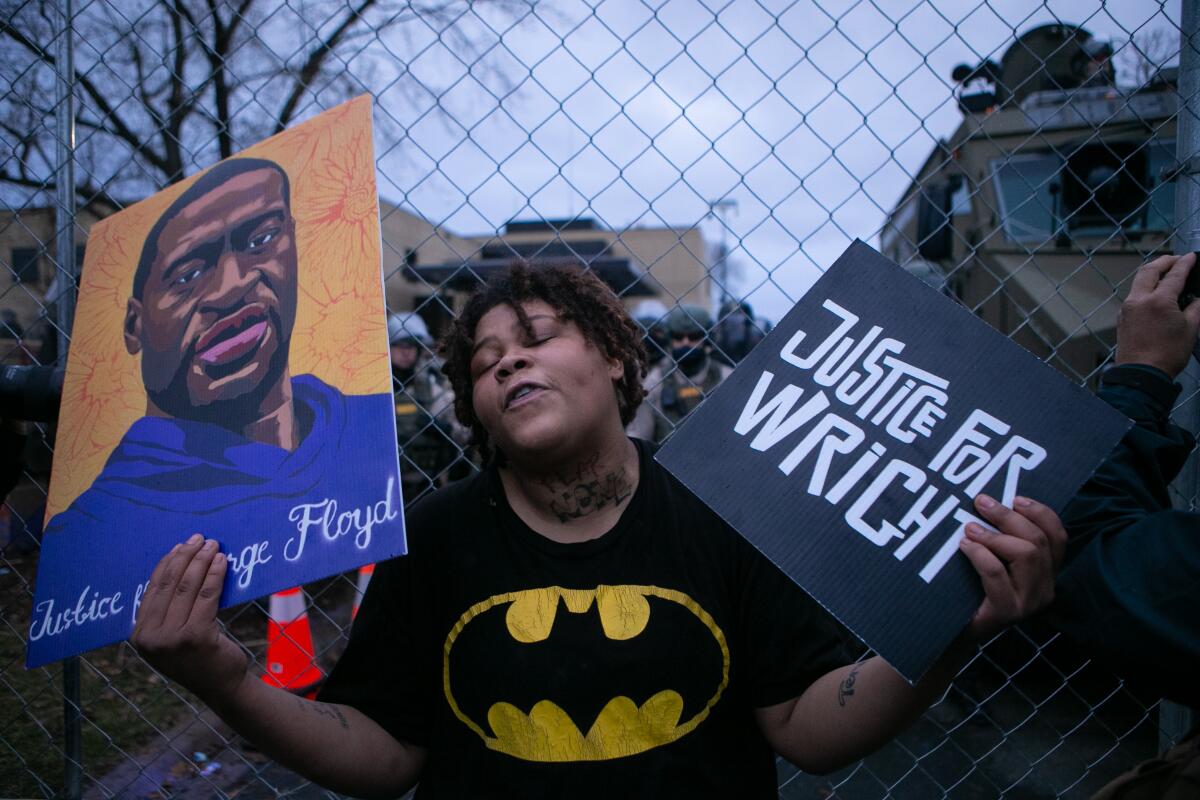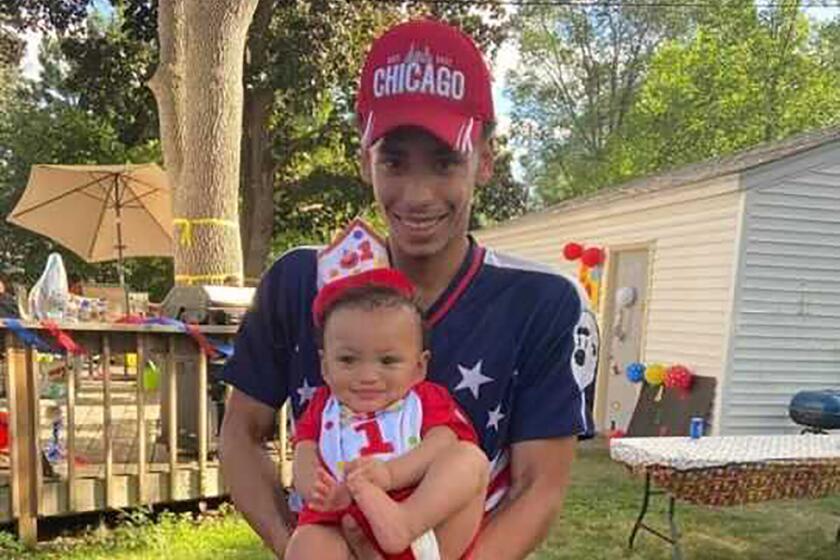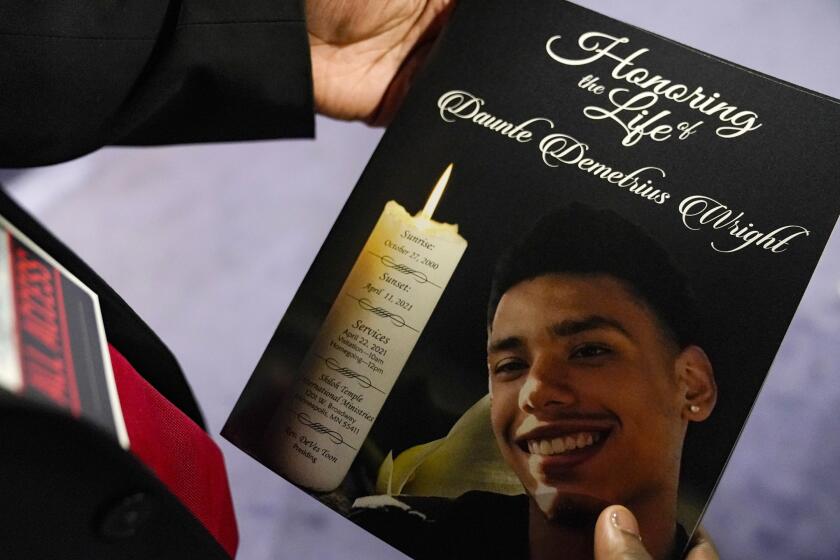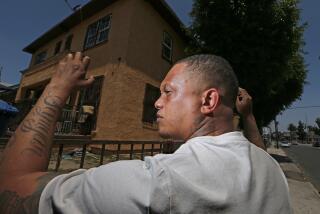Mostly white jury seated in trial of officer who shot Daunte Wright

- Share via
MINNEAPOLIS — A mostly white jury was seated Friday for the trial of a suburban Minneapolis police officer who said she drew her handgun by mistake when she fatally shot Black motorist Daunte Wright following a traffic stop.
Opening statements were to begin Wednesday in the case against Kim Potter, 49, who is charged with first- and second-degree manslaughter in the April 11 shooting in the suburb of Brooklyn Center.
Potter, who is white, has said that she meant to use her Taser on Wright after he tried to drive away from officers while they were attempting to arrest him, but that she grabbed her handgun instead. Her body camera recorded the shooting.
The last two jurors, both alternates, were quickly seated Friday morning.
Nine of the first 12 jurors seated — the ones who will deliberate if no alternates are needed — are white, with one juror identifying as Black and two as Asian. The panel is evenly split between men and women. The two alternates are also white.
The jury roughly matches the demographics of Hennepin County, which is about 74% white. Its makeup was closely watched, as legal experts have said that juries that are diverse by race, gender and economic background are necessary to minimize bias in the legal system.
As civil rights advocates called for justice and police accountability over Daunte Wright’s death, his family asked people also to remember his life.
The jury is markedly less diverse than that chosen for the trial last spring of former Minneapolis Officer Derek Chauvin in George Floyd’s death. In that case, the 12 who deliberated were split 50-50 between white people and people of color.
Ted Sampsell-Jones, a professor at Mitchell Hamline School of Law in St. Paul, said Chauvin’s jury was “mostly just luck of the draw.”
He said racial and ethnic diversity matters in terms of the perceived legitimacy of the jury, but attitudes about police and policing are much more important for the case outcome.
Former police officer Kim Potter is standing trial in Minnesota on manslaughter charges in the fatal shooting of Daunte Wright.
“It might be true in general that Black people are more distrustful of police than white people, but it isn’t true as to every individual,” Sampsell-Jones said. “Lots of young white people in Hennepin County are far more progressive and anti-cop than some older Black people, for example.”
Alan Tuerkheimer, a Chicago-based jury consultant, said even a single juror of color can be enough to change the dynamics of deliberations by bringing more depth and another viewpoint to the process.
Attorneys and the judge have questioned potential jurors for their views of protests against police brutality that were frequent in Minneapolis even before the death of George Floyd in May 2020.
Katie and Aubrey Wright remember their son as “an amazing, loving kid” in first interview since he was fatally shot by police officer Kim Potter.
Questionnaires asked about attitudes toward police, including whether officers should be second-guessed, whether they get the respect they deserve and whether jurors personally trust them.
Juror No. 11, for example, said she “somewhat agreed” that officers should not be second-guessed.
“I think sometimes you just react, and sometimes it might be a wrong reaction, but, you know, mistakes happen,” she said. “People make mistakes.”
She was seated after saying she could set that view aside and consider evidence.
Several jurors strongly disagreed that it’s unreasonable to question officers’ actions. Juror No. 19, the only Black person on the jury, wondered how Potter could show such a “lapse in judgment” with her experience.
“This is a servitude job, and when you get into this position, you need to understand that it’s a tough job and so you have to maintain that level of professionalism when you get into that position,” she said of police officers in general.
Potter, who resigned two days after she shot and killed Wright, has told the court she will testify. The body-camera video recorded Potter saying, “Taser, Taser, Taser,” before she fired, followed by: “I grabbed the wrong ... gun.”
Wright, 20, was shot as Chauvin was standing trial 10 miles away in the murder of Floyd. Wright’s death sparked several nights of intense protests in the suburb.
The most serious charge against Potter requires prosecutors to prove recklessness; the lesser only requires them to prove culpable negligence. Minnesota’s sentencing guidelines call for a sentence of just over seven years on the first-degree manslaughter count and four years on the second-degree one. Prosecutors have said they would seek a longer sentence.
More to Read
Sign up for Essential California
The most important California stories and recommendations in your inbox every morning.
You may occasionally receive promotional content from the Los Angeles Times.












